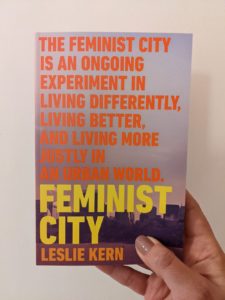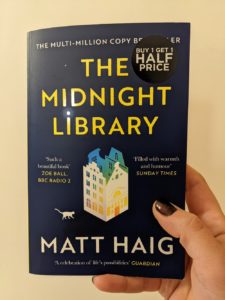Feminist City by Leslie Kern
Written by Ashley Kelmore, Posted in Feminism, Reviews
Best for:
Urban planners, geographers, feminists. Women who live or desire to live in a city.
In a nutshell:
Feminist Geographer Kern shares her thoughts on on how we can improve urban spaces to the meet the needs of people who aren’t just white men.
Worth quoting:
“The provisions made for ‘bubble dining domes’ while homeless people’s tents were violently dismantled illustrates the stark divide over who we believe should have access to public space.”
“It’s clear that the time has come to decentre the heterosexual, nuclear family in everything from housing design to transportation strategies, neighbourhood planning to urban zoning.”
“Makings cities seem safe for women also tends to make them less safe for other marginalized groups.”
Why I chose it:
My partner and I exchange books for Christmas; this was one of his gifts to me. He knows me well.
Review:
I grew up in the suburbs but pretty immediately made a beeline for cities once I graduated high school. I went to college in Seattle, lived in Los Angeles for a year, move to NYC for graduation school and stayed for seven years, jumped to London, moved BACK to Seattle for another eight years, and am now living in London. While I occasionally dream of living in a tiny village in Scotland, the reality is I think I’ll always need to be living in a city.
But, as author Kern points out, cities aren’t exactly made for me. Now, as a middle-class, assumed-straight, white, thin-ish, able-bodied woman, it’s made more for me that many other women, but still. Cities are built around the needs of white men, and that can make life for the woman have just as much right and claim to experiencing a free and fulfilled life in those blocks frustrating, challenging, and even dangerous.
Kern breaks her book up into six areas to explore: city of men, city of moms, city of friends, city of one, city of protest, and city of fear. The first section serves as the introduction, setting out the main premise that cities have been designed by and for (white) men. From there she discusses each area in turn, focusing on the ways cities either are not welcoming to the subjects (e.g. to moms) or, in the case of the chapter on fear, focusing on how the set-up of cities can contribute to women being unsafe, and the actions women are forced to take to counteract and prevent harm.
As I read books, I write in them (it’s why I tend to not make use of libraries – writing in books is critical to my understanding and absorbing their contents). I was flipping through to write this review, and noticed that I had starred and underlined more in the city of moms chapter, which is odd as I am not a mom. But I have a lot of friends who are moms, and I can see how so much of our cities are not set up in ways to support someone who is caring for (and often carrying) a tiny human.
I appreciate that Kern attempts to take an intersectional view of things. For example, in her chapter on city of fear, she focuses heavily on the reality that many things that some women have been pushing for to make themselves feel safer put other, more marginalized people at risk. An example of this is seeking increased police presence, or the speed with which some women are willing to call the police on people of color – white women might end up feeling safer (though probably aren’t actually any safer), but women who are not white, as well as men of color, are put at an even higher risk. In the city of protest chapter, she also acknowledges how some of her early protest experiences may have been lacking in their understanding of how her demands might negatively impact her trans sister and street-based sex workers.
What a gem of a book. It’s fairly short at under 200 pages, but still manages to pack a ton of insight, research, and examination into those pages without feeling overly academic.
Recommend to a Friend / Keep / Donate it / Toss it:
Recommend to a Friend and Keep



